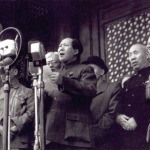
Writer Discusses Election Reform And Calls For Deep Changes to Elections Across the World
Democracy Chronicles founder Adrian Tawfik conducted an exclusive interview series with an international group of election method proponents including prominent signers of the Declaration of Election-Method Reform Advocates. The best place to start off is the Democracy Chronicles introduction and then take a look at each of these interviews:
- Richard Fobes – Election Method Reformer Speaks With DC
- Aaron Hamlin – Interview With President of Center for Election Science
- Andrew Jennings – Redistricting, Vote Splitting and Honest Voting
- augustin – Writer Discusses Election Reform and New Website
- Michael Allen – Election Method Reformer Seeks Radical Changes
- Jameson Quinn – Election Expert Discusses Reform in US and Guatemala
- Michael Ossipoff – Democracy Chronicles Author Discusses Approval Voting
- Robert Bristow-Johnson – Expert Demands Reducing Money in Elections
Also see the DC Interview With Creator of Wooden Models of Voting Methods with artist Peter A. Taylor.
A big thanks for your support goes out to augustin, founder of minguo.info!
At Democracy Chronicles, we have seen that people from all over the world and from all walks of life are organizing for democracy. Our new writer, Augustin, has been writing from Taiwan for DC and has been also working on a website promoting radical changes to the election system used across the democratic world. Among other things, in this interview Augustin discusses his website, election methodology and US politics. Please check out Augustin’s article on DC, Minguo: a Unique Online Democracy Experiment, and check out his new election reform website at minguo.info.
Interview with Augustin
DC: Where does your interest in election method reform stem from? Where were you first introduced to the topic?
Augustin:
Like everyone else, I used to believe that an election necessarily meant voting for one single candidate amongst a plurality of candidates, a system known as Plurality Voting. I never considered the fact that there could be alternative or better ways to elect public officials. In that respect, the 2000 London Mayoral election was an eye opener for me. I used to live in England, up to 1997, and after leaving the UK I kept following the news from there. Thus, it’s in 1999 or 2000, in the period leading up to the first London Mayoral election, that I heard that the election would be held using an alternative method, called the Supplementary Vote, under which the voters can not only vote for their favourite but also for their 2nd favourite. I think it’s the first time I heard about the existence of alternative election methods. It made sense to me and felt much less limiting than Plurality Voting.
Soon, I started to do some research online and found the former web site of Michael Ossipoff, one of your guest writers. At that time, his web site was the reference about election methods. The web site is now defunct. Fortunately, Mr. Ossipoff has since then helped me to republish most of his articles at minguo.info.
Thus I discovered that Election Methods could be the subject of scientific research, with its experts, its theories and its empirical studies. Returning to the London Mayoral elections: I later learned that the election method used there is a variant of a method known in the US as Instant Runoff Voting, which theory and practice both prove it to be almost no better than the usual Plurality Voting. Indeed, the four mayoral elections (2000~2012) held under that system have done nothing to break the two-party electoral stronghold. Both Mr Ossipoff and myself advocate simpler and better methods like Approval Voting or Score Voting (follow the last two links to cast your vote in sample ballots).
DC: What made you decide to build Minguo?
Augustin:
Simply because minguo.info can become an important tool to promote essential solutions for today’s society. Since a very young age, I have always been aware of many of our society’s difficulties and challenges. What frustrates me the most is that there are known solutions to most if not all of the problems we are facing today. Unfortunately, those solutions are maybe not well known or not well understood but they are certainly not being applied and used to the extent necessary to make lasting changes.

Of all the solutions, the ones that appeal to me the most are those that strive to cure the root cause of some known problems. They are systemic solutions because they recognize that the system itself is flawed and will keep producing the same negative effects until it, the system itself and not any of the symptoms, is reformed.
Our electoral democracies are flawed. What’s more, the flaws are deeply rooted in our collective consciousness to the extent that people are having a hard time perceiving the true causes of our problems. When I talk to people about better Election Methods, it is obvious from their reactions that they fail to see the extent to which our current system is polluting political discourse and, ultimately much more importantly, our public policies. Their lives are being adversely affected by a broken system but they fail to recognize it. They do notice and complain about the symptoms, but they don’t make the connection with the broken electoral system.
The actions of elected public officials and the policies they vote on and enact have an obvious tremendous effect on us all, on the economy, the environment, our welfare and the welfare of future generations. The fact that we cannot use a proper system to get the right people to do these very important jobs explain to a very large extent the overall mess we are in right now.
My motivation in building Minguo is to promote solutions! The role of minguo.info is to promote systemic changes related to our electoral democracies, promote better Election Methods. Minguo has a very strong educational role. We aim to reach out to a very large number of citizens of our modern day democracies and hope to achieve a critical mass that will, at long last, enable the systemic changes that are critically needed today.
DC: What was involved in setting up Minguo? Can you discuss who was involved and what you needed to do to prepare for the launch?
Augustin:
The launch of big commercial web sites is often prepared long in advance. The company has the funds to make sure that everything is ready before the launch. The software is fully developed. Writers prepare a certain amount of content that will hopefully interest users. Then the marketing team makes the launch coincide with a big marketing campaign to make as big a splash as possible in order to jump start a community.
It didn’t happen this way for us. Minguo is a charity project started with just enough funds to pay for the web hosting and nothing else. Minguo evolves and grows in a much more organic way. A web site like minguo.info has three main components: a software, some content and a community. Working on a web site means building up those three components.

The software is essential as it provides services and tools that the community can use. Minguo.info really stands apart from other political web sites because of its software. Since the main topic of the site is Election Methods, I obviously made sure that the site has the necessary tools to demonstrate the alternatives we want to promote. A software is never completed. Developing it, improving it and fixing bugs is and shall remain an ongoing process. I am the sole developer for the customized software that runs Minguo.
As noted above, Michael Ossipoff has contributed a lot of content to the site, and he still does. In accordance to our educative mission, we want to develop further our informational articles on Election Methods and electoral reforms. Most content is user-generated though. Users are welcome to use our software and the unique tools it provides to discuss any topic that may interest them.
As to the community, it is currently still quite small but it is growing. Many fellow EM activists have already joined. I am involved in an outreach effort with interested people. I am very confident that the community will continue to grow steadily. I am looking forward to the months and years ahead.
DC: Minguo has a Community Manifesto that is written collectively by contributors. What is your idea of a finished product in this regard? Are you looking for a document like a constitution?
Augustin:
Ah! This is probably one of the most important aspects of the whole Minguo project.
The short answer is that the Manifesto will become whatever the members will collectively make of it!
“Constitution” has a very specific meaning and I hadn’t thought of the Manifesto that way. But I guess that some users may want to use the Manifesto to draft their ideal Constitution or to propose amendments to the US Constitution. That would be interesting. Part of the Manifesto could also include a constitution for the minguo.info community, a set of community-approved rules to regulate internal processes.
However, I think of the Manifesto more in terms of a list of policies that the community approves of. We usually vote for representatives hoping they will carry out the policies we really care about. Here, we have an opportunity to directly vote on the policies in question. Minguo provides the tools for its members to take the legislative process into their own hands. They can prepare a document that they could show to the US Congress and say: “This is what we want!”
There is no ‘finished product’ for the Community Manifesto, just like you cannot ask lawmakers for when they will have finished writing all the laws the country will ever need, or like you cannot ask a software developer when he’ll have completely finished his software! ;)
The Manifesto will constantly evolve, become better and more detailed. As the community grows, the content of the Manifesto will have the support of an ever increasing number of people. Individual members will not necessarily agree with every single detail in it, but every single detail will be supported by an absolute majority of the members. Together, we will put the US Congress to shame: because we are using better voting systems, we’ll be able to show that we can do a better legislative job than they do!

The better voting processes used internally at minguo will greatly attenuate the pre-existing bitter opposition between the two sides of the two-party system. Instead, we fully expect the left/right division to be replaced by a strong Centre. Think of this Centre like the bulging centre of a galaxy (SEE IMAGE) around which gravitates an infinite number of special interests and topics. Just like the heart of a galaxy is its gravitational centre, the Manifesto will attract all the best ideas coming from the whole community.
What I am looking forward to is the time when the Community Manifesto will be detailed and elaborate enough that it will become a reference for bloggers, for political web sites, and even for mainstream media and policy makers! By that time, the Community Manifesto will have the backing of a very strong community and together, we’ll be able to shape the national political and policy discourse.
DC: Are there governments with existing election methods that you approve of?
Augustin:
No. We know of several governments using one variant or another of IRV, and the practice proves the theory: this Election Method is not much better than the more prevalent Plurality Voting system. However, some fellow Election Method activists have had some successes in promoting better alternatives such as Score Voting in some local organizations. For example, Clay Shentrup and the Center for Election Science have been instrumental in getting the Harvey Milk Democratic Club, the largest Democratic club in San Francisco to use Score Voting for their endorsements.
I believe that they are also behind the decision of two German local Pirate Parties (in Lower Saxony and in North Rhine-Westphalia) to also adopt Score Voting. One of these actually uses Emocracy, which is a simple variant of Score Voting. These are all good news and I am hoping that the Minguo community will be instrumental in more such successes at the local levels.
Earlier, I noted that Plurality Voting is deeply rooted in our collective consciousness. Better alternatives will not take root as long as this remains true. Hence, the way to our success depends on our ability to increase the visibility of alternative voting systems on the web as well as within our local communities, as was achieved in the examples I have just cited. This is precisely what minguo.info is trying to achieve by providing a software that people can use so that they can get accustomed to different ways to vote.
DC: What do you think is the most pressing election reform where you live? Is the situation getting better or worse?
Augustin:
Before I answer this question, I should precise that I live in the Republic of China. The Republic of China, founded in 1912 by Sun Yat-sen is now a free and democratic country which held its first free presidential elections in 1996. It is not to be confused with the other China which is the communist dictatorship, the People’s Republic of China, founded in 1949 by the communist revolutionary Mao Zedong.

I arrived in the ROC in 1997 and I witnessed the first transition of power between two parties after the 2000 presidential elections. It was very interesting to note that the 2000 and 2004 presidential elections here in Taiwan were almost a carbon copy of what happened in the USA in the 1836 and 1840 presidential elections! By that I mean that the same causes (Plurality Voting) gave rise to the same consequences (the division of the country into two opposing factions). It was really enlightening to witness first hand the same process occur at the dawn of the 21st century in a young Asian democracy as had happened in the mid-19th century USA! This would be the topic for another article!
So, from the point of view of democracy, the situation here has gotten better. The KMT regime and its martial law has, against all odds, peacefully given way to a vibrant democracy. However, from the point of view of Election Methods, I expect things to become worse because this China is going the same way as the US has been going all along, with the results that we see now in the US. What’s worse, despite my personal efforts, there doesn’t seem to be any Taiwanese grassroots activists proposing such reform, unlike there is in the US (e.g. Democracy Chronicles and many of its guest writers!)
But, for the Republic of China, the most pressing matter is its lack of recognition on the international scene. The country cannot even change its name to a more logical “Republic of Taiwan” for fear of igniting the ire of the PRC and starting a war across the Taiwan straight. So, the country cannot but keep its obsolete name of Republic of China. And each time westerners use the country name “China” as if there were only one China, they are playing by the propaganda book of the Chinese Communist Party and (unknowingly) promoting the dictatorship’s hegemonic agenda.
DC: What is your view of the US elections?
Augustin:
This year’s elections (at every levels) exemplify everything that is wrong with the current Election Method! The media have already noted that negative campaigning is at an all-time high. I do not mean to imply that both sides are equally guilty. I don’t want to name anybody, but candidates on one side seem particularly prone to lying and deceiving people. Read my lips! Or, as we would say in French: ‘Suivez mon regard!‘
Having said that, I don’t blame so much the candidates as I blame the electoral system itself. The current Plurality voting incites candidates to use negative campaigning techniques because they work in such a system. With a better Election Method, those same techniques would back-fire, leading to a more poised, honest, policy-oriented debate. Everything I could say about the US elections has already been said, and much better, by countless other people.
There is one thing, however, that I very rarely, if ever, see commented upon and that I really would like everybody to know: each time American people complain about the elections, about the candidates, about the lying, about the negative ads, etc, *they miss the target!* They perpetuate the fiction that there is nothing wrong with the electoral system and that we only need to change people: “If only we had better candidates!” or “If only we had a better informed electorate!” or “If only we had more objective media!”
No! However much I empathize with such statements, they do nothing to elucidate the fact that all of these are symptoms of a chronic disease and that a holistic cure would necessarily involve a systemic change! People complain a lot, with good cause, but they point in the wrong direction, ensuring that nothing will significantly ever change. We have to put the spotlight on the real culprit, get it out in the open. That’s what Minguo is trying to do.
We need to use the current elections and all subsequent ones as opportunities to educate the American people, to help them connect the dots! Change the system, change the Election Method, and within two or three election cycles, you’ll get a much better and wider choice of candidates all around, at every levels.
DC: Is there a possibility of election method reform in the US?
Augustin:
Today? No!
There is one thing I have tried to point out throughout this interview: we need to increase the American people’s consciousness about the real problems and the solutions we have been discussing all along. However imperfect the Union might be, American people do live in a democracy. Voters ask for many things, and they do not necessarily get it, although with time and enough effort, the Will of the People always ends up prevailing.
For example it took close to 150 years from the time of the abolition of slavery in the United States to the first African American being elected President. It certainly took time and a lot happened throughout this century and a half with regard to the emancipation of African American people, but the US finally got there!
One thing is sure, though: the electorate will never get what it does not ask for. And today, the people who campaign for electoral reform and for a better Election Method are despairingly few and far between. So, today, the conditions are obviously not yet met for these important reforms to take place. But I am confident it will happen sometimes in the future and I don’t think it will take another 150 years to get there!
Indeed, there is a lot that can make us hopeful. To start with, American people are certainly fed up with the current state of affairs. They might be more open to the new ideas that we propose. There is a small core of EM activists who have already had successes like the ones noted earlier. There is Democracy Chronicles who has a very clear editorial line in favour of such reforms. Obviously, there is also the Minguo project, which, I have no doubt about it, will grow exponentially and become a key player in this field. Most importantly, there is the partnership between DC and Minguo, because we all know that it is only together that we will achieve great victories.
What was the question again?
DC: Is there a possibility of election method reform in the US?
Augustin:
Tomorrow? Soon?
Certainly! :)
DC: Is there anything you wish to mention that we haven’t covered?
Augustin:
Well, I hope I have been thorough enough in my answers above that we have covered all the main ground. Besides, we need to keep something aside for a future interview! ;)
I would like to thank Democracy Chronicles for giving me this opportunity to express myself on these topics which are very close to my heart. I am also very grateful to DC for fighting the good fight by bringing the real issues to its readers.
And I am grateful to all the people who across the US and across the world, are doing whatever they can to promote and build a better, fairer, more peaceful future for us all and for future generations. We may not know each other. We may not have heard of each other’s work. But we are on the same team, building different aspects of the same dream. Thank you for all your personal contributions.
For more information on the subject of election reform, see our Election Reform, Third Party, and Election Methods pages that are the gateway to accessing our coverage.
Leave a Reply